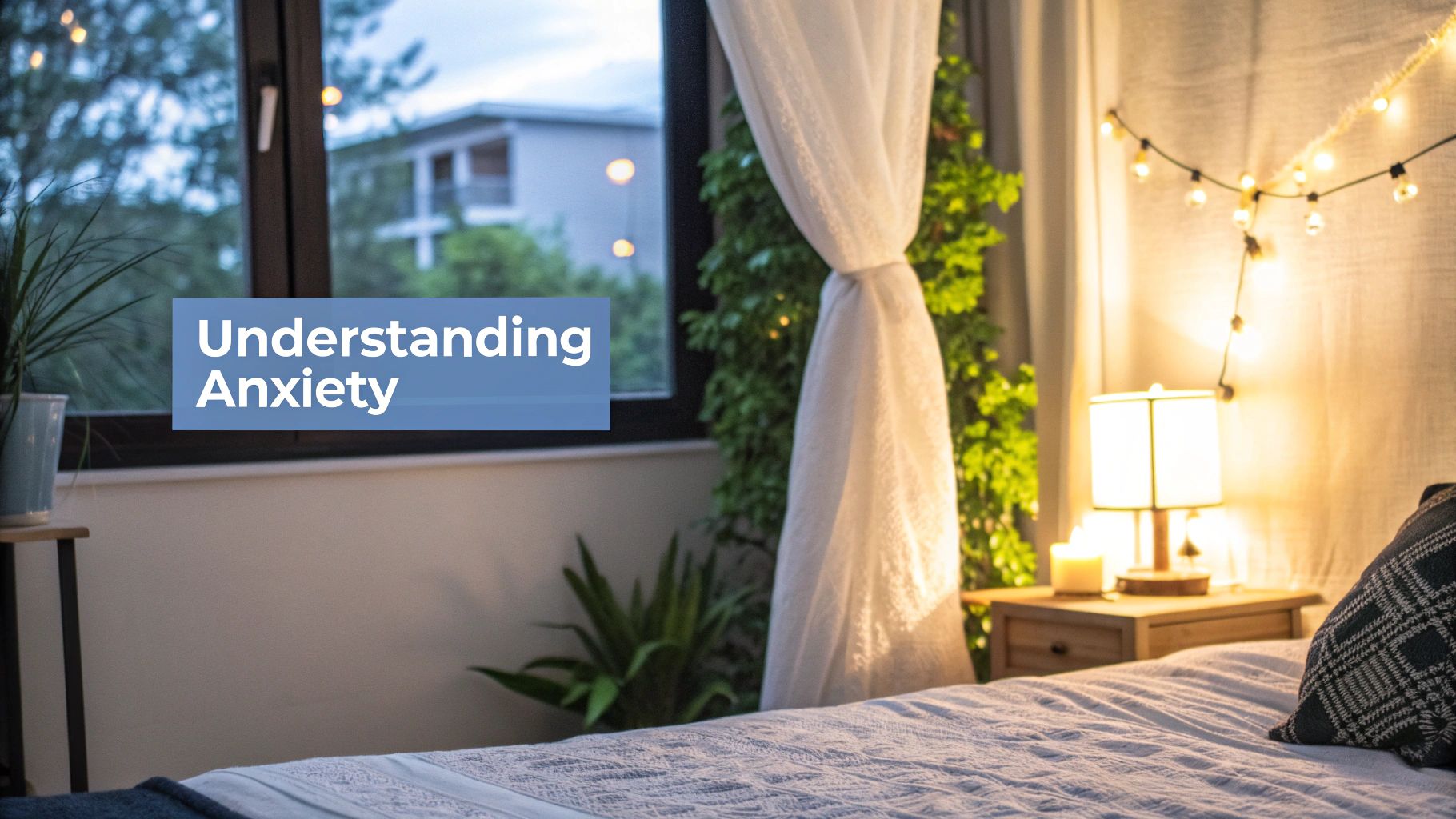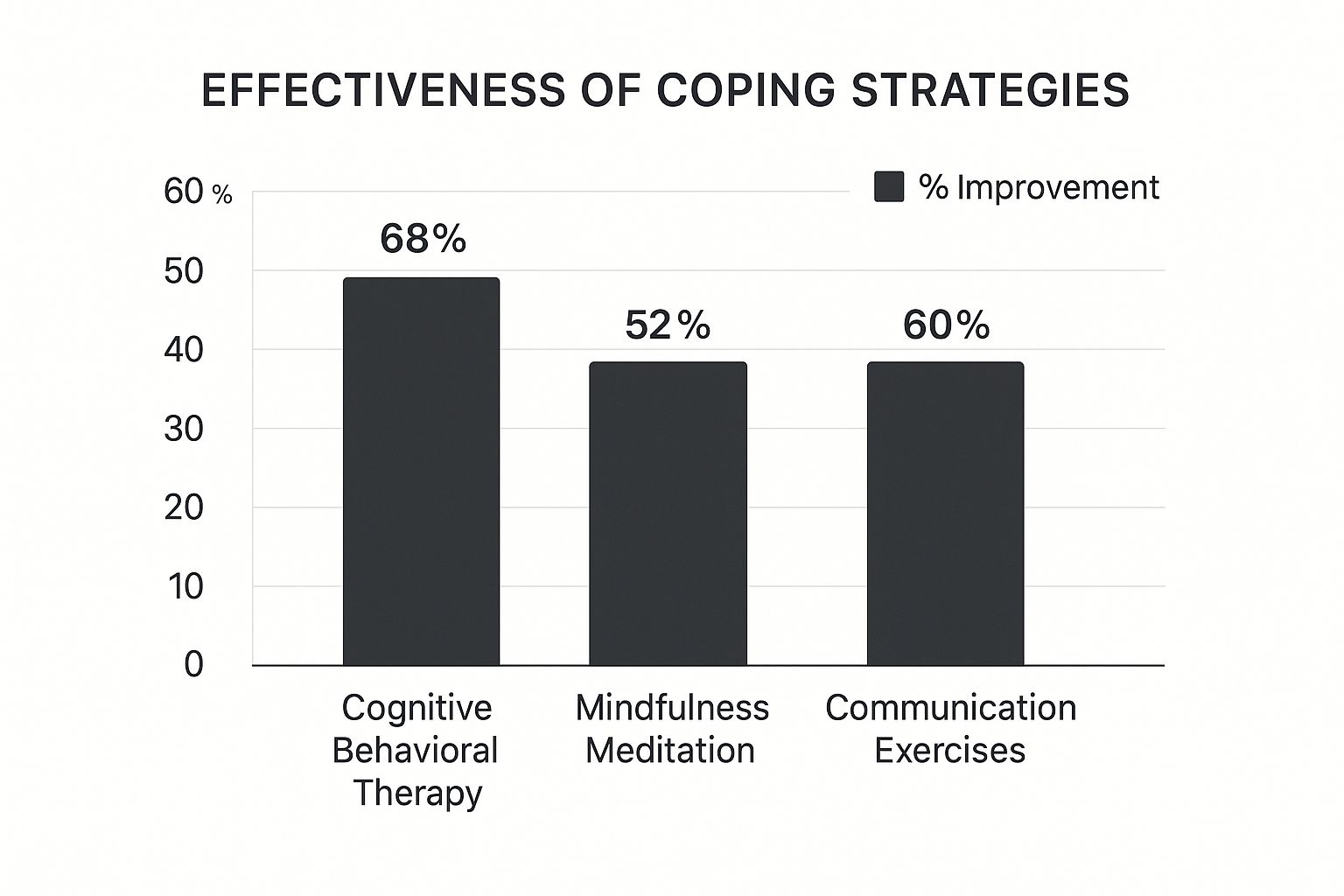It's that sinking feeling, a nagging thought that worms its way into your mind right when you least need it: "What if I can't perform?"
If that sounds familiar, you've stumbled upon the core of sexual performance anxiety. It's a surprisingly common hurdle, and the crucial thing to understand is that it isn't a sign you're broken. It’s a very human response to pressure, and one you can take active steps to overcome.
What Is Sexual Performance Anxiety, Really?

When anxiety kicks in, your body flips the "fight or flight" switch. It floods your system with stress hormones like adrenaline and cortisol.
These hormones are fantastic if you're running from a sabre-toothed tiger, but they're terrible for romance. They constrict blood vessels and pull you out of the relaxed state needed for arousal. Suddenly, your fear of failing becomes a self-fulfilling prophecy.
The Cycle of Worry and Self-Doubt
This anxiety often creates a vicious loop. It might start with one bad experience—perhaps a night when you were stressed, tired, or had too much to drink. That one instance plants a tiny seed of doubt.
The next time you're intimate, your brain flashes back to that "failure," and the internal chatter starts. This isn't just a case of the jitters. It's a mental trap known as spectatoring, where you disconnect from the moment and start watching yourself, judging your every move like a critic in the stands.
"Many men who believe they have ED actually have normal erectile variability. They can best avoid developing ED by not focusing on their erections or creating pressured sexual experiences."
Once you're in that headspace, it's almost impossible to be present with your partner. Instead of focusing on connection and pleasure, all your energy goes into worrying. Each time it happens, the cycle gets stronger, making the next encounter feel even more daunting.
You Are Not Alone in This Struggle
It’s easy to feel like you’re the only one going through this, but that couldn’t be further from the truth. The pressure to perform is a real psychological weight, and its effects are widespread.
Here in the UK, the numbers speak for themselves. Around 11.7 million men have reported dealing with sexual performance issues. In fact, a shocking one in eight men face problems every single time they're intimate.
The anxiety can be so overwhelming that it causes nearly 60% of men to avoid sex altogether. If you want to dig deeper into the data, you can explore more about the impact of performance anxiety on men's health.
Realising you're part of a huge group facing the same challenge is the first practical step. It helps you shift your narrative from "What's wrong with me?" to "Okay, what can I do about this common problem?" That simple reframe is a powerful starting point for breaking the cycle and rebuilding a confident, connected intimate life.
Actionable Steps to Reframe Your Mindset

Breaking free from performance anxiety starts in your head. The cycle of worry is a mental habit that you can unlearn and replace with healthier thought patterns. This section gives you practical techniques to take control of your inner voice.
Your anxious thoughts are not facts; they are just thoughts. When the familiar worry "What if I can't perform?" pops up, you have the power to stop and challenge it.
Step 1: Catch and Challenge Negative Thoughts
This is a practical technique from cognitive behavioural therapy (CBT) that you can start using today. The goal is to spot negative, automatic thoughts and consciously swap them for more realistic ones.
Here’s a step-by-step action plan:
- Catch the Thought: The moment you feel anxious, identify the specific thought causing it. For example: "I'm going to disappoint my partner."
- Identify the Distortion: Recognise this as a mental trap. In this case, it's mind reading—you're assuming you know what they're thinking.
- Challenge and Replace: Actively create a balanced response. Tell yourself: "I can't read my partner's mind. We're here to connect, and focusing on that is more important than achieving a perfect performance."
This simple three-step process stops the anxiety spiral. You shift from being a passive victim of your thoughts to actively managing your mindset.
By learning to question your automatic thoughts, you reclaim control. Instead of letting fear run the show, you can choose to focus on connection, pleasure, and just being in the moment with your partner.
Step 2: Shift Your Focus from Performance to Pleasure
Performance anxiety thrives when the goal is a perfect outcome. The most powerful way to dismantle this pressure is to change the goal entirely. Here’s how.
Instead of aiming for a specific result, shift your focus to the physical sensations and connection of the moment. Try these mindfulness exercises:
- Action 1: Pay attention to the physical feeling of your partner's skin.
- Action 2: Focus on your own breathing and consciously slow it down.
- Action 3: Listen intently to the sounds in the room and the sound of their voice.
This is a form of mindfulness. It pulls you into the "now" and leaves very little room for anxious thoughts about what might happen next. When your mind is fully engaged with your senses, the inner critic fuelling your sexual anxiety performance loses its power.
This mental shift takes practice, but it’s a skill you can build. For a deeper dive into managing these feelings, you might find our guide on addressing anxiety and performance helpful. Every time you redirect your attention from performance to presence, you weaken anxiety’s grip.
How to Talk About This With Your Partner

Trying to tackle sexual performance anxiety alone is an uphill battle. Bringing your partner into the fold is one of the most effective actions you can take. This isn't about admitting defeat; it’s about recruiting your most important teammate.
When you frame it as an opportunity to connect, it stops being "my problem" and becomes "our challenge to solve together."
Step 1: Find the Right Time and Words
Like any tough conversation, timing and approach are crucial. Do not bring this up in the bedroom or right after a difficult moment. Instead, pick a neutral time when you’re both relaxed and won't be interrupted, like over coffee or during a walk.
To start the conversation, use "I" statements to own your feelings without sounding accusatory.
Here are a few practical conversation starters:
- "I've felt a bit stuck in my head during intimacy lately, and I’d love to find ways for us to connect without any pressure."
- "Can we talk about something? I’ve realised I'm dealing with some anxiety around sex, and I want us to be on the same team with it."
- "Our connection is so important to me. I've been feeling some pressure, and I think talking about it would really help us."
This conversation is your chance to redefine what "success" looks like in the bedroom. When you shift the goal away from a specific outcome, you create space for intimacy to grow without the weight of expectation.
Step 2: Create a Supportive Action Plan Together
It’s helpful to remember how societal pressures can play a part. In the UK, unspoken expectations on men's sexual performance often fuel anxiety. Meanwhile, women generally report higher rates of anxiety, creating a dynamic where both partners might be struggling silently. Understanding this can build empathy. You can read the full research about gender and anxiety patterns to learn more.
Once you’ve started talking, create a practical plan to lower the stakes.
- Actionable Tip: Agree to take penetrative sex off the table for a while. This simple step instantly removes the main source of pressure.
- Alternative Focus: Use this time to rediscover other kinds of intimacy. Focus on sensual touch, massage, or simply being physically close without any end goal.
This approach rebuilds confidence and reminds you both that intimacy is a spectrum of shared experiences. By making connection the new goal, the burden of sexual anxiety performance starts to lift.
Lifestyle Changes That Build Resilience
Your mind and body are deeply connected. The small, everyday habits you keep have a massive impact on how you handle performance anxiety. Building resilience is about making consistent, small adjustments that lower your baseline stress levels. Here are actionable steps you can take.
Action 1: Prioritise Physical Activity
Exercise is one of the most powerful, non-prescription tools to fight anxiety. It helps burn off stress hormones like cortisol and adrenaline while triggering the release of endorphins—your body’s natural mood elevators.
Your Goal: Aim for 30 minutes of moderate activity most days of the week. This could be a brisk walk, a bike ride, or a session at the gym. The key is consistency.

This image breaks down the effectiveness of different strategies, showing how a structured approach leads to significant improvements. It’s clear that while therapies like CBT are highly effective, practices like mindfulness and communication—both of which are tied to lifestyle—also deliver huge positive results.
Action 2: Re-evaluate Your Alcohol Intake
Many people reach for a drink to "relax" before intimacy, but alcohol is a depressant that can interfere with arousal and erection. While it might quiet your anxious mind for a moment, it often makes the physical side of things harder, fuelling the anxiety cycle.
Your Goal: Try cutting back on alcohol, especially on days you plan to be intimate. This gives your nervous system a fair chance to function without depressants holding it back.
Anxiety is a widespread issue in the UK. Statistics from 2022/23 showed that around 37.1% of women and 29.9% of men reported high anxiety levels, which can directly get in the way of sexual function. Taking control of your lifestyle choices is a powerful step.
Taking control of your lifestyle choices is a powerful form of self-care. It sends a clear message to your brain that you are actively building a foundation of calm and stability, which naturally translates to more confidence in the bedroom.
Action 3: Optimise Your Diet and Sleep
What you eat directly impacts your mood and energy. A diet high in processed foods, sugar, and caffeine can worsen anxiety. Instead, focus on a balanced diet of whole foods.
Below is a quick-start guide to making impactful changes.
Lifestyle Changes and Their Impact on Anxiety
| Lifestyle Adjustment | Mechanism of Action | Practical Tip |
|---|---|---|
| Regular Exercise | Burns excess cortisol and releases endorphins, which are natural mood elevators. | Aim for a 30-minute brisk walk, five times a week. It’s simple but incredibly effective. |
| Reduced Alcohol | Prevents the depressive effect on the central nervous system that hinders arousal and erection. | Try swapping your usual pre-date drink for a non-alcoholic alternative or sparkling water. |
| Balanced Diet | Stabilises blood sugar and provides nutrients essential for producing mood-regulating neurotransmitters. | Add a handful of walnuts or a portion of salmon to your weekly meals for a boost of healthy fats. |
| Quality Sleep | Allows the brain to process emotions and regulate stress hormones like cortisol effectively. | Create a "wind-down" routine. Put your phone away an hour before bed and read a book instead. |
Your Goal: Aim for 7-9 hours of quality sleep each night. This is when your body regulates stress hormones and repairs itself, setting you up for a calmer, more centred day. If you need extra support, check out our guide on supplements for stress and anxiety.
Natural Supplements to Support Your Journey
Mindset shifts and lifestyle changes are your foundation, but certain natural supplements can provide powerful backup. Think of them as a tool to help your body build resilience against the physical side of stress, reinforcing the other positive work you're doing.
Many of these are adaptogens, which help your body adapt and become more resistant to physical, chemical, and biological stress. When anxiety is high, adaptogens help bring your body's overactive stress response system back into balance.
How Adaptogens Can Help
When you feel anxious, your body pumps out the stress hormone cortisol. Chronically high cortisol can disrupt everything from sleep to hormones, making performance anxiety worse. Adaptogens step in to help regulate this response, promoting a calmer, more balanced state.
One of the most well-known adaptogens is Oji Shilajit. It’s a mineral-rich resin sourced from high-altitude mountains, used for centuries to support the body's stress management systems.
Think of your stress response like a thermostat. When anxiety cranks up the heat, adaptogens help recalibrate it, bringing it back down to a more comfortable, manageable level instead of letting it overheat.
By helping to modulate cortisol, ingredients like Shilajit can take the edge off the physical feelings of anxiety. This makes it easier to stay present and connected with your partner.
Integrating Supplements into Your Routine
Adding a supplement works best when it complements your other positive changes. It’s not a magic pill, but a supportive player that enhances the benefits of mindfulness, better sleep, and communication. The key is consistency.
Here’s a simple action plan:
- Mindset Work: Rewrite the mental scripts that fuel anxiety.
- Lifestyle Changes: Upgrade your physical health to better handle stress.
- Supplements: Support your body’s internal systems to work in harmony.
This three-pronged approach ensures you’re tackling the issue from all angles. By supporting your body’s ability to handle stress, you build a more stable foundation for sexual confidence. To learn more about how these natural compounds work, explore the many Shilajit benefits for boosting energy and wellness.
Your Questions on Performance Anxiety Answered
Here are clear, straightforward answers to the most common questions about sexual performance anxiety, giving you a final action plan to move forward with confidence.
How Do I Even Start This Conversation with My Partner?
Action: Pick a calm, neutral time outside the bedroom. Start with "I" statements to share how you feel without blaming anyone. Try this script: "Lately, I've been feeling a lot of pressure, and it's making it hard for me to relax and enjoy being with you. I'd love for us to tackle this as a team." The goal is to make it about your shared connection.
Is This Just a “Guy Thing”? Can Performance Anxiety Affect Women Too?
Absolutely. While the focus is often on men and erectile dysfunction, women experience it as trouble with arousal, orgasm, or even pain during sex. The root causes—fear of judgment, body image worries, and pressure to please a partner—are universal. The strategies in this guide, like open communication and mindfulness, are effective for anyone struggling with these feelings.
Remember, the root of performance anxiety is universal—it’s the fear of not measuring up. Realising this can build a huge amount of empathy and understanding between partners, no matter their gender.
When Should I Think About Getting Professional Help?
Action: If the anxiety is seriously impacting your relationship or causing you to avoid intimacy altogether, it's time to talk to a professional. Don't wait until you hit rock bottom. A therapist specializing in sex therapy or a counsellor trained in cognitive behavioural therapy (CBT) can provide targeted strategies. Reaching out for support is a proactive step for your mental and sexual health.
Are Supplements Like Oji Shilajit a Quick Fix?
No. Think of supplements as a supportive tool, not a magic wand. Adaptogens like Shilajit work by helping your body become more resilient to stress over time.
Action: Use them to complement your primary efforts. The most lasting change in overcoming sexual anxiety performance comes from a combination of shifting your thoughts, communicating better, and making healthier lifestyle choices. Supplements are there to reinforce the solid foundation you’re building.
Ready to build a stronger foundation against stress and anxiety? Oji Shilajit offers a natural way to support your body's resilience, complementing your journey toward greater confidence and vitality. Discover the benefits and start your journey with Oji Shilajit today.








